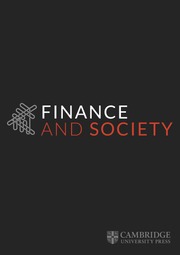Article contents
Introduction: Money's other worlds
Published online by Cambridge University Press: 09 November 2023
Extract
Since at least the nineteenth century, economists have imagined the market as a profoundly rational way of organizing society. These visions betray a mechanical conception of economy. In many ways the contemporary financial economy does look like a machine. But if global finance is a machine, then there is something irrational, something supernatural – even magical – about the way it operates. It is not just the periodic bouts of mania, panic, and crisis; nor is it the apparently endless drive to accumulate, to conjure more and more wealth out of a void. It is that in these and other processes, a range of psychic investments are at work – curious attachments that bind us to money, to projected futures, to imaginary orders, and ultimately, to the modes of power upon which capitalism depends. The magical parts make and move the mechanical whole. This is the controversial idea developed in a string of new books to which this forum is dedicated.
- Type
- Forum: Money’s other worlds
- Information
- Creative Commons
- This is an Open Access article, distributed under the terms of the Creative Commons Attribution-NonCommercial-No Derivatives licence (http://creativecommons.org/licenses/by-nc-nd/4.0/), which permits noncommercial re-use, distribution, and reproduction in any medium, provided the original work is unaltered and is properly cited. The written permission of Cambridge University Press must be obtained for commercial re-use or in order to create a derivative work.
- Copyright
- © 2015 The Author(s)
References
- 5
- Cited by


